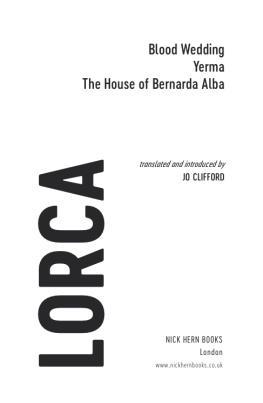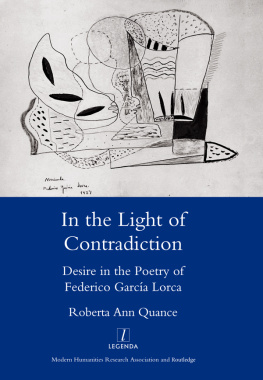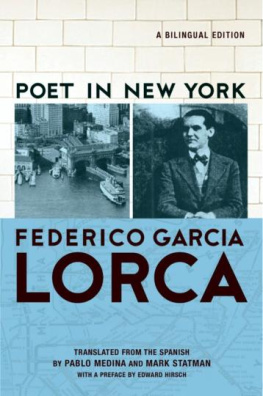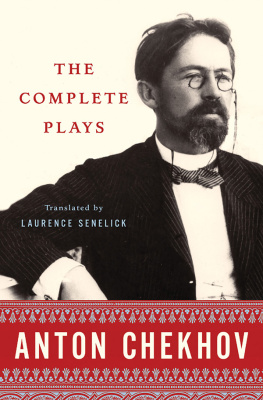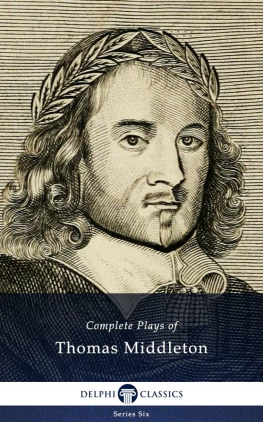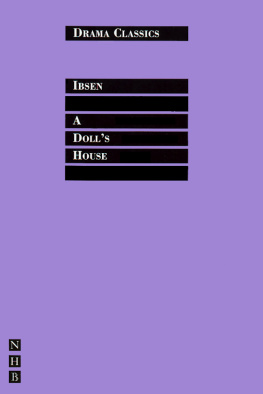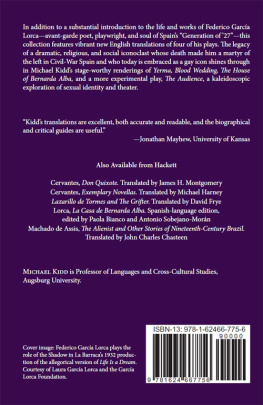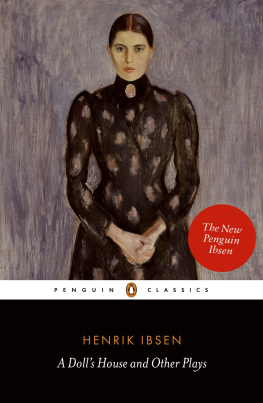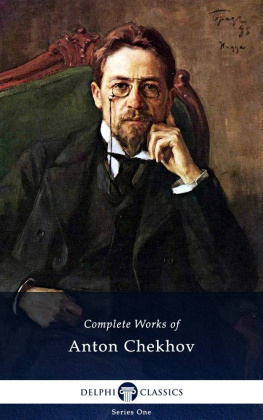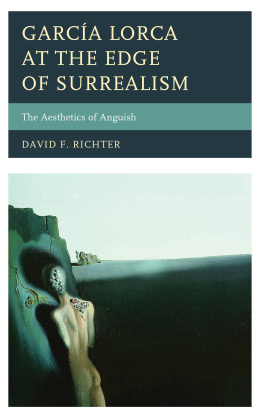Contents
Introduction Federico Garca Lorca (18981936) Lorca was born on 5 June 1898. The year was a hugely significant one in Spanish cultural and political history: it gave its name to a whole generation of writers who used the events of this year as a rallying cry in efforts to convince the Spanish people of their countrys deplorable state and the desperate need for re-evaluation and change. They were called the Generation of 98, and they included Azorn, Baroja and ngel Ganivet. The historical event that inspired this movement was the disastrous war with the United States which led to the loss of Cuba, Spains last remaining colony. This apparently distant event was to have huge repercussions for Lorca. Cuba had been Spains principal source of sugar; Lorcas father was to be astute enough to plant his land with sugar beet, and with the aid of a series of successful land purchases, he was to become one of the richest men in the Fuente Vaqueros district.
A long-term consequence of this was that Lorca himself never needed to earn his own living. Theres no question this wealthy background contributed both to the large volume, and the technical and emotional daring, of his work. As it happened, Blood Wedding in particular was hugely successful; but the financial security of his position left him absolutely free to write as he wanted without regard to the demands of the commercial theatre of his day. However, the most immediate consequence for the young Lorca was that he spent his childhood as the rich son of the wealthiest landowner of a mainly poor village. Perhaps the best way for us to imagine the impact on Lorcas sensibility is to think of our own feelings towards the desperately poor of the Third World or the homeless that many of us pass each day on the street. The contrast between his wealth and the poverty of so many of those around him left a deep impression on Lorca, which he was to express in later life in his autobiographical essay My Village.
The plight of one family affected Lorca particularly deeply. One of his friends in the village was a little girl whose father was a chronically ill day labourer and whose mother was the exhausted victim of countless pregnancies. The one day on which Federico was not allowed to visit their home was washing day: the members of this family had only one set of clothes, and they had to stay inside their house while their only clothes were being washed and dried. Lorca wrote: When I returned home on those occasions, I would look into the wardrobe, full of clean, fragrant clothes, and feel dreadfully anxious, with a dead weight on my heart. He grew up with a profound sense of indignation at this kind of injustice: No one dares to ask for what he needs. to demand bread. to demand bread.
And I who say this grew up among these thwarted lives. I protest against this mistreatment of those who work the land. The young man who wrote this protest at the end of his adolescence maintained a profound anger right to the end of his life. In an interview he gave in 1936, he stated: As long as there is economic injustice in the world, the world will be unable to think clearly. He continued the interview with a fable to illustrate the difficulties of creating valid art in a situation of economic injustice: Two men are walking along a riverbank. One of them is rich, the other poor.
One has a full belly and the other fouls the air with his yawns. And the rich man says: What a lovely little boat out on the water! Look at that lily blooming on the bank! And the poor man wails: Im hungry, so hungry! Of course. The day when hunger is eradicated there is going to be the greatest spiritual explosion the world has ever seen. Im talking like a real socialist, arent I? For Lorca, the art of creating theatre was totally bound up with the process of creating a better society: The idea of art for arts sake is something that would be cruel if it werent, fortunately, so ridiculous. No decent person believes any longer in all that nonsense about pure art, art for arts sake. At this dramatic moment in time, the artist should laugh and cry with his people.
We must put down the bouquet of lilies and bury ourselves up to the waist in mud to help those who are looking for lilies. For myself, I have a genuine need to communicate with others. Thats why I knocked at the door of the theatre and why I now devote all my talents to it. This passionate anger at the injustice of human society, and equally passionate determination to create art that might remedy it, were fuelled not simply by his childhood experiences. As an adult, he had travelled to New York, and witnessed at first hand the devastating impact of the Wall Street crash: Its the spectacle of all the worlds money in all its splendour, its mad abandon and its cruelty This is where I have got a clear idea of what a huge mass of people fighting to make money is really like. The truth is that its an international war with just a thin veneer of courtesy We ate breakfast on a thirty-second floor with the head of a bank, a charming person with a cold and feline side quite English.
People came in there after being paid. They were all counting dollars. Their hands all had the characteristic tremble that holding money gives them Colin [an acquaintance] had five dollars in his purse and I three. Despite this he said to me: Were surrounded by millions and yet the only two decent people here are you and I. And when he writes so angrily of the thwarted lives of those whose existence is dominated by money, it is clear Lorca is thinking not simply of the plight of the rural poor, but also of the bourgeoisie to which he himself, and many of us, now belong. He is concerned not simply with the suffering that a wealthy middle class inflicts on those beneath them on the social scale; he is equally concerned with the suffering they inflict upon themselves.
The thwarted lives he saw in his village are not simply those of the poor. Lorca perceived this very clearly: for the comparative wealth possessed by the characters in these plays brings them no happiness. They seem trapped by the conventions and the demands of the society they inhabit. Lorca and Theatre Lorca once said that you could judge the health of a nations culture by looking at the state of its theatre. And for him theatre was a natural extension of poetry: a poetry that leaps off the printed page, escapes from between the pages of books and becomes human. It shouts and speaks.
It cries and despairs. For Lorca there was nothing precious about poetry; it was simply part of living. He once wrote: Poetry is something that just walks along the street. Because for him it was a part of living, to be deprived of it was a kind of torment; and to deprive people of the chance of experiencing it was a kind of crime. In an interview he gave to an English journalist he spoke of his anger at the lack of theatre that was the norm in Spain outside the capital: Theatre is almost dead outside Madrid, and the people suffer accordingly, as they would if they had lost eyes or ears or sense of taste. He also said, I will always be on the side of those who have nothing.
He was a political writer in the deepest sense, in that the act of writing was part of the struggle for a better world. Sometimes, when I think of what is going on in the world, I wonder why am I writing? The answer is that one simply has to work. Work and go on working. Work and help everyone who deserves it. Work even though at times it feels like so much wasted effort. Work as a form of protest.
For ones impulse has to be to cry out every day one wakes up and is confronted by misery and injustice of every kind: I protest! I protest! I protest! All these concerns came together in Lorcas work for La Barraca, the travelling theatre he helped to found in the early years of the Republic. They would set up a simple stage in the town square and perform the great, and then almost completely neglected, classics of the Spanish theatre the works of Lope de Vega, Tirso de Molina and Caldern. His work on this incredibly bold and imaginative precursor of our own small-scale touring companies had a profound effect on Lorca. Experiencing the impact these classics made on a mass audience was a source of strength and inspiration; and working on the texts themselves must surely have deepened his remarkable theatre writing skills. Nature and Folk Culture Lorca paints a bleak picture of rural life in these plays. But there are moments when we catch glimpses of a very different view of the countryside.

